July 28, 2022 — The Society of Environmental Journalists is pleased to announce the winners of the SEJ Awards for Reporting on the Environment, which honor the best stories released from February 1, 2021, through January 31, 2022, and the best books on environmental topics published in 2021.
The SEJ contest is the world's largest and most comprehensive environmental journalism competition. This year, 485 entries in ten categories were judged by independent volunteer panels of journalists and professors.
On October 26, 2022, we held virtually the 2022 #SEJAwards Ceremony. The first-place winners in 10 categories shared how they got their award-winning stories. We also announced live the winner of the Nina Mason Pulliam Award and its $10,000 cash prize. Watch the recording.
SEJ's 2022 Awards for Reporting on the Environment are...
Kevin Carmody Award for Outstanding Investigative Reporting, Large
Kevin Carmody Award for Outstanding Investigative Reporting, Small
Outstanding Beat Reporting, Large
Outstanding Beat Reporting, Small
Outstanding Explanatory Reporting, Large
Outstanding Explanatory Reporting, Small
Outstanding Feature Story, Large
Outstanding Feature Story, Small
Outstanding Student Reporting
Rachel Carson Environment Book Award
SEJ's 2022 Esteemed Judges and Screeners
SEJ's 2022 Awards Committee
Kevin Carmody Award for Outstanding Investigative Reporting, Large
First Place
"Sacrifice Zones: Mapping Cancer-Causing Industrial Air Pollution" by Al Shaw, Lylla Younes, Ava Kofman, Lisa Song, Max Blau, Kiah Collier, Ken Ward Jr., Alyssa Johnson, Maya Miller, Lucas Waldron and Kathleen Flynn for ProPublica, with The Texas Tribune and Mountain State Spotlight
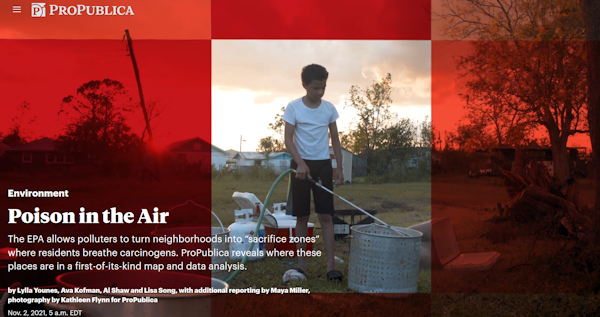 |
| Screenshot of first-place story, Carmody Reporting, Large |
Team roles:
- Al Shaw, ProPublica, Deputy Editor, News Apps
- Lylla Younes, ProPublica, News Application Developer
- Ava Kofman, ProPublica, Reporter
- Lisa Song, ProPublica, Reporter
- Max Blau, ProPublica, Reporter
- Kiah Collier, ProPublica/The Texas Tribune Investigative Initiative Reporter
- Ken Ward Jr., ProPublica Distinguished Fellow, Co-Founder Mountain State Spotlight
- Alyssa Johnson, ProPublica Engagement Reporting Fellow
- Maya Miller, ProPublica Engagement Reporter
- Lucas Waldron, ProPublica Visual Investigations Editor
- Kathleen Flynn, ProPublica Photographer, Freelance
Story links:
- "Poison in the Air"
- "The Most Detailed Map of Cancer-Causing Industrial Air Pollution in the U.S."
- "What's Polluting the Air? Not Even the EPA Can Say."
- "The Dirty Secret of America's Clean Dishes"
- "A Plant That Sterilizes Medical Equipment Spews Cancer-Causing Pollution on Tens of Thousands of Schoolchildren"
Judges' comments: "This unprecedented data-driven investigation identified more than 1,000 hot spots of hazardous industrial air pollution across the U.S. that elevate the cancer risk of more than a fifth of the nation's population. The team analyzed publicly available EPA emissions data, found and corrected reporting errors the agency had failed to catch. With the enhanced database, data journalists developed an interactive mapping tool the public can use to identify the estimated risk of toxic air pollution in their neighborhoods. The data analysis and the mapping tool were the foundation for the extensive reporting required for the five stories: nearly 100 record requests, hundreds of interviews, combing through corporate paperwork and on-the-ground reporting in nine states. EPA's response to the series was quick. The agency committed to looking into toxic hot spots, plus pledged new cumulative risk guidelines, a more robust analysis of air pollution and targeted actions, such as unannounced inspections. More than 76 local news outlets ran stories about analysis, expanding the impact of the project by informing local communities of air pollution risks. ProPublica said it has trained local reporters on how to use the mapping tool."
Second Place
"Invisible" by Steven Mufson, Isabelle Khurshudyan, Chris Mooney, Brady Dennis, John Muyskens (graphics), Naema Ahmed, Juliet Eilperin, Desmond Butler, Anu Narayanswamy, Max Bearak, Joshua Partlow and Salwan Georges (photos and video) for The Washington Post
Story links:
- "Russia Allows Methane Leaks at Planet's Peril"
- "Countries' Climate Pledges Built on Flawed Data, Post Investigation Finds"
- "The Race To Defuse Congo's Carbon Bomb" (photos by Ley Uwera)
- "Mexico's Wheat Fields Help Feed the World. They're Also Releasing a Dangerous Greenhouse Gas." (photos by Luis Antonio Rojas)
- "This Tree Has Stood Here for 500 Years. Will It Be Sold for $17,500?" and same day story: "Beyond Glasgow, Kerry Pushes To Close Emissions Gaps"
Judges' comments: "For this exceptional multipart series, The Washington Post measured the gap between greenhouse gas emissions countries report to the U.N. under the Paris climate accord and total emissions in the atmosphere. The months-long data investigation revealed global emissions are likely 16 to 23 percent higher than countries are reporting. It found the U.N. process to rein in emissions to curb global warming relies on 'messy, incomplete and unreliable' data. As a result, The Post's climate team built its own database by reviewing 30 years of emissions data from UNFCCC reports for 45 nations and all years of data from another 148 countries. It examined atmospheric concentrations of carbon dioxide, nitrous oxide and methane; standardized measurement data for the different gases; and developed complex models. Climate and emissions experts guided the team's methods throughout the project. The team used satellites to identify methane leaks. It identified massive methane leaks and venting of the powerful greenhouse gas in Russia's Tatarstan region. Post reporters traveled to Russia to find the spot of the major leak the country refused to divulge; to Mexico's Yaqui Valley, where farmers' use of excessive amounts of fertilizer emits nitrous oxide; to Alaska to look at the future of a 500-year-old tree that stores 12 metric tons of carbon; and to the Congo basin where Ikenge villagers face pressure to preserve its carbon-storing peatlands."
Third Place
"Skagit: River of Light and Loss" by Susannah Frame, Ryan Coe, Eric DeRosiers, Kevin Glantz, Dave Wike, Michael Botsford, Pete Cassam, Mike Perry and Julie Wolfe for KING 5 Television
Team Roles:
- Susannah Frame, Reporter
- Ryan Coe, Photojournalist
- Eric DeRosiers, Photojournalist
- Kevin Glantz, Graphic Artist
- Dave Wike, Photojournalist
- Michael Botsford, Photojournalist
- Pete Cassam, Photojournalist
- Mike Perry, Photojournalist
- Julie Wolfe, News Director
Story links:
Judges' comments: "This yearlong, 15-part series showed that Seattle City Light operated a hydroelectric dam in a way that killed struggling salmon despite the public utility's claims to the contrary — actions that Indigenous peoples of the Skagit Valley said caused cultural trauma for their members. Using sharp reporting and beautiful images, this multifaceted series followed the story as it unfolded, showing the impact not only on wildlife but on people and their community. The journalists explained the science in a relatable way and showed what environmental degradation means to real people, making an emotional connection with the viewer. The series also highlighted a local issue with national resonance. And the reporting made a difference. After 2.5 years of refusing to study fish passage at its electric dams, the utility agreed to a study one day after the first story aired. The reporting also led City Light to create a $2.5 million fund to help Skagit fish species on the endangered species list and double its budget for scientific studies related to re-licensing of the dams. Great work all around, and an inspiration to other local and regional television stations."
First Honorable Mention
"Rainforest Destruction: The Supply Chains to U.S. Consumers" by the four teams below for The Pulitzer Center's Rainforest Investigations Network, The New York Times, NBC News, The Philippine Center for Investigative Journalism
The Pulitzer Center's Rainforest Investigations Network
Gustavo Faleiros
Jelter Meers
Marina Walker
Kuek Ser Kuang Keng
The New York Times
Manuela Andreoni, Pulitzer Center reporting fellow
Hiroko Tabuchi
Albert Sun
Victor Moriyama
NBC News
Andrew Lehren, Pulitzer Center reporting fellow
Anna Schecter
Christine Romo
Didi Martinez
Tom Llamas
Jacob Ward
Stephanie Gosk
Jane Derenowski
Rich Schapiro
Santiago Cornejo
Janine Eduljee
Philippine Center for Investigative Journalism
Karol Ilagan, Pulitzer Center reporting fellow
Elyssa Lopez
Rachel Ganancial
Kimberly dela Cruz
Martha Teodoro
Joseph Luigi Almuena
Sofia Bernice Navarro
Ma. Cecilia Pagdanganan
Kyla Ramos
Story links:
- "How Americans' Appetite for Leather in Luxury SUVs Worsens Amazon Deforestation," The New York Times
- "How the Rise of Electric Cars Endangers the 'Last Frontier' of the Philippines," NBC News
- "This Fabric Is Hailed As 'Eco-Friendly.' The Rainforest Tells a Different Story." NBC News
- "Crude Reality: One U.S. State Consumes Half the Oil From the Amazon Rainforest," NBC News
Judges' comments: "This New York Times/NBC News package, produced in partnership with the Pulitzer Center's Rainforest Investigations Network and the Philippine Center for Investigative Journalism, revealed how everyday consumption is driving rainforest destruction in Brazil, the Philippines, Indonesia and Ecuador. Rigorous and thorough on-the-ground reporting, often in dangerous areas, traced how through legal loopholes the hides of cattle raised on illegally deforested Amazon land in Brazil produce massive amounts of leather for the U.S. and elsewhere to use in auto leather seats and many other products; a nickel mine in the Philippines plans to triple its size into a pristine rainforest to meet the growing demand for electric vehicle batteries; Indonesian rainforests are being chopped down for plantations to produce viscose rayon used to make clothing, often labeled as eco-friendly; and Ecuador's state-run oil company is building a new road deep inside Yasuni National Park forest to tap into new crude resources it sells around the world, much of it to California. Their reporting was cited in a major legal case in Brazil which resulted in a judicial order protecting the region studied by The New York Times. The viscose story prompted a European Union proposal to increase regulation of the industry."
Second Honorable Mention
"Hot Days: Heat's Mounting Death Toll on Workers in the U.S." by Cheryl W. Thompson and Robert Benincasa (NPR); Jacob Margolis and Adriene Hill (The California Newsroom); Stella M. Chavez, Sara Willa Ernst, Dominic Walsh and Fernanda Camarena (The Texas Newsroom); Julia Shipley, David Nickerson, Brian Edwards, Cascade Tuholske and Kristen Lombardi (Columbia Journalism Investigations); and Jim Morris (Public Health Watch) for NPR, The California Newsroom, The Texas Newsroom, Columbia Journalism Investigations and Public Health Watch
Story links:
- "Heat Is Killing Workers in the U.S. — And There Are No Federal Rules To Protect Them"
- "Higher Temperatures and Less Oversight Mean Workers Are at a Growing Risk in the Climate Emergency"
- "Texas Workers Are Dying in the Summer Heat, and Companies Aren't Being Held Accountable"
- "California Firefighters Keep Getting Injured During Training. Some Have Died"
Judges' comments: "This team project is a great example of what news outlets can do when they band together to investigate crucial environmental issues. The foundation for the investigation was an extensive, original database of worker heat fatalities recorded by OSHA, which was built and analyzed by the journalists. Using powerful audio reporting, they told the wrenching stories of workers who lost their lives doing their jobs — showing the terrible toll of an issue that will only become more relevant as climate change causes the planet to continue warming. One month after the first installment, OSHA announced that it would add worker protections to step up inspections on hot days and begin developing a federal rule to safeguard workers against heat illnesses. And at least 30 federal lawmakers backed legislation that would require OSHA to implement a heat standard."
Third Honorable Mention
"The World's Thirst for Palm Oil Is About To Destroy Asia's Largest Remaining Rainforest" by Peter Yeung for VICE World News
Judges' comments: "Vice World News broke new ground in investigating the rapid expansion of gathering palm oil, in this case from Indonesia's Papua region. Indonesia is the world's largest exporter of palm oil, a $23 billion industry for the world's largest island country. Through satellite imaging, data gathering and on-the-ground reporting Yeung reported that over the 20-year period up to 2020, the region lost 955,000 hectares of tree cover. More than 70% of that occurred over the past decade as the rainforest has been replaced by palm oil monoculture. With compelling photography, multimedia and data presentation, and extensive reporting on the ground, the palm oil package ultimately had a significant impact including the revocation of more than 2,000 permits."
Kevin Carmody Award for Outstanding Investigative Reporting, Small
First Place
"The Department of Yes: How Pesticide Companies Corrupted the EPA and Poisoned America" by Sharon Lerner for The Intercept
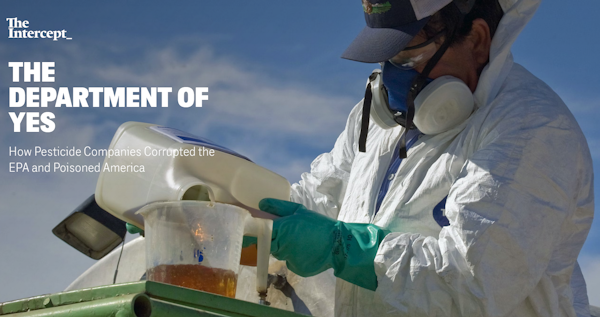 |
| Screenshot of first-place story, Carmody Reporting, Small |
Judges' comments: "This deeply reported article chronicled the undue influence of agrochemical companies on the U.S. Environmental Protection Agency and highlighted the grave consequences for public health. Sharon Lerner painted a damning portrait of an agency unable or unwilling to carry out its most basic mandate by relying on industry studies and data to approve pesticides despite evidence they were unsafe. The story is well sourced, including drawing on interviews with many former EPA staffers, and uses documents and interviews to tell the history of influence over the agency stretching back to its origins. It is laced with shocking revelations about some of the most widely used pesticides in the country, making the case that because of this history of influence, 'countless children and pregnant people' have been exposed to what are now known to be unsafe levels of toxic chemicals."
Second Place
"Déjà Vu As Palm Oil Industry Brings Deforestation, Pollution to Amazon" by Karla Mendes for Mongabay
Story links:
- "Déjà Vu As Palm Oil Industry Brings Deforestation, Pollution to Amazon"
- "Brazil Prosecutors Cite Mongabay Probe in New Legal Battle Against Palm Oil Firms"
- "Behind the Scenes Video Unveils Water Contamination by 'Sustainable' Amazon Palm Oil"
Judges' comments: "Karla Mendes went through great personal risks to report on this story about the personal havoc and the environmental harm the palm oil industry has brought to an Indigenous community in the Amazon. Mendes had to work with a hostile industry and local government to get this story out and suffered health risks and attacks to her life during the reporting process. And above all, she brought international attention to this issue and created real impact using her storytelling which is what investigative reporting is supposed to do."
Third Place
"Sucked Dry: A Mega-Dairy Is Transforming Arizona's Aquifer and Farming Lifestyles" by Debbie Weingarten and Tony Davis for High Country News
Judges' comments: "The judges were impressed with the breadth and sweep of 'Sucked Dry,' which took a hard look at how one mega-dairy was affecting the long and storied landscape of small dairy farmers as well as the natural resources underpinning much of agriculture. The reporters successfully knitted what seemed like disparate stories about ag economy and environment in two disparate states, and skillfully linked them through the operations of this single dairy behemoth, and related the story through the eyes of people whose lives are affected in Minnesota and Arizona. It is hard to read this account without seeing the future."
First Honorable Mention
"Fractured: The Body Burden of Living Near Fracking" by Kristina Marusic for Environmental Health News
Story links:
- "Harmful Chemicals and Unknowns Haunt Pennsylvanians Surrounded by Fracking" (Part 1)
- "The Stress of Being Surrounded" (Part 2)
- "Distrustful of Frackers, Abandoned by Regulators" (Part 3)
- "Buffered From Fracking But Still Battling Pollution" (Part 4)
- About Our Data: How EHN Tested the Air, Water and Urine of Families in Pennsylvania Fracking Country for Harmful Chemicals
Judges' comments: "The reporting by Marusic was stunning in its thoroughness, using urine, air and water sample tests over two years to document long-suspected dangers of living near fracking wells. As she noted, this was the first time many of those persons had been tested. The findings, which included measurements of chemicals in exposed children at 91 times average, should shake Pennsylvania."
Second Honorable Mention
"Seresto" by Johnathan Hettinger, reporter, and Brant Houston, editor, Midwest Center for Investigative Reporting; and Emily LeCoz, editor, USA TODAY Network for Midwest Center for Investigative Reporting and USA TODAY Network
Story links:
- "Popular Flea Collar Linked to Almost 1,700 Pet Deaths. The EPA Has Issued No Warning."
- "Seresto Pet Collars Under EPA Review, But the Fight Over Their Safety Could Take Years"
- "EPA Opens Public Comment Period on Petition To Ban Seresto Collars"
- "The EPA Internally Raised Concerns About Seresto Flea Collar for Years, New Records Reveal"
Judges' comments: "Hettinger’s investigative series about the U.S. Environmental Protection Agency's oversight of flea and tick pet collars revealed a shocking failure of the agency to protect not only animals but the children who live with them from hazardous pesticides. Hettinger used internal documents to bolster the claims of a whistleblower that the EPA was aware of thousands of reports that the Seresto collar was causing hair loss, seizures and even deaths in animals, yet failed to alert the public to the risks."
Third Honorable Mention
"Investigation on India's Controversial River Linking 'Ken-Betwa Link' Project" by Dheeraj Mishra for The Wire
Story links:
- "Ignoring Damning SC Panel Report, Modi Govt Kickstarts Work on Ken-Betwa"
- "Ken-Betwa Link: Not Enough Land To Compensate for 23 Lakh Trees Cut, Govt"
- "Ken-Betwa Link: Refusing to Do New Hydrological Study, Govt Moves Ahead With 18-Year-Old Data"
- "Ken-Betwa Link: Jal Shakti Secy Had Rejected Provisions on Water-Sharing Between UP and MP"
- "Ken-Betwa: No Cost Analysis or Environment Impact Study, Structures Make Way Into Project"
Judges' comments: "Mishra's reporting on the controversial river linking project is commendable for pinning down the negative impacts of the project on the environment. Mishra used hard-to-get government documents, spent weeks poring through paper records in government offices and travelled to remote parts of India to track down sources to produce a rich piece of storytelling and accountability journalism."
Outstanding Beat Reporting, Large
First Place
"COP26 Beat Reporting" by Fiona Harvey for The Guardian
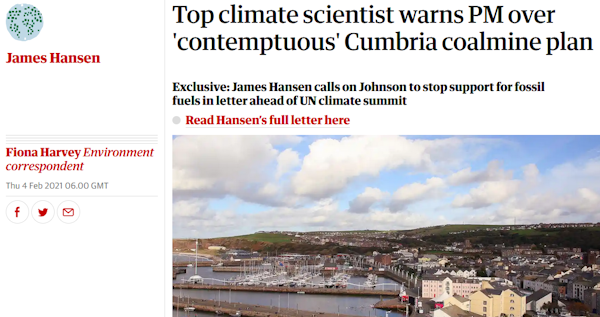 |
| Screenshot of first-place story, Beat Reporting, Large |
Story links:
- "Top Climate Scientist Warns PM Over 'Contemptuous' Cumbria Coalmine Plan"
- "Boris Johnson Told To Get Grip of UK Climate Strategy Before COP26"
- "COP26 Climate Talks Will Not Fulfil Aims of Paris Agreement, Key Players Warn"
- "COP26 Targets Too Weak To Stop Disaster, Say Paris Agreement Architects"
- "Ratchets, Phase-Downs and a Fragile Agreement: How COP26 Played Out"
Judges' comments: "A longtime environment reporter, The Guardian's Fiona Harvey managed to cover COP26 like no one else in the media. In the months before the climate talks, Harvey exposed the duplicity of the UK's government which, while preparing to host COP26, green-lighted a coal mine. Scooping her competitors, she reported on a letter sent by renowned scientist James Hansen to Prime Minister Boris Johnson pleading with him to stop development of the mine. Her work had a significant impact, forcing the government to backtrack on the project.
"During the climate meetings in Glasgow in November, Harvey's clear, accessible and engaging coverage stood out, thanks to her unique access, deep grasp of environmental issues and flair for writing. Fiona Harvey's work is testament to the importance of having dedicated reporters covering the environmental beat."
Second Place
"Adaption: How People, Government and Industry Adjust to a Warming Planet" by Christopher Flavelle for The New York Times
Story links:
- "Tiny Town, Big Decision: What Are We Willing To Pay To Fight the Rising Sea?" (photographs and video by Erin Schaff)
- "Why Does Disaster Aid Often Favor White People?"
- "Dispossessed, Again: Climate Change Hits Native Americans Especially Hard" (with Kalen Goodluck)
- "Scorched, Parched and Now, Uninsurable: Climate Change Hits Wine Country"
- "Climate Change is Bankrupting America's Small Towns" (photographs by Mike Belleme)
Judges' comments: "In five masterfully executed stories, Christopher Flavelle showed that the full impact of climate change is often found in the details. His pieces illuminated the financial complexities facing coastal communities in the Outer Banks; exposed the racial disparities in federal disaster aid that disproportionately favor whites over people of color; and explored the differing effects of wildfire smoke on reds and whites in California's wine country.
"Flavelle is an expert craftsman who knows exactly what follow-up questions to ask. His work goes deep, and his expansive reporting and attention to people and place impressed not only the judges on this panel but the lawmakers, cabinet members and state officials who took action after reading his work."
Third Place
"Unmitigated Damage: Inside the Federal Fight To Save Wetlands" by Hannah Northey and Kevin Bogardus for E&E News
Story links:
- "Exclusive: Trump Rule Imperils More Than 40,000 Waterways"
- "Historic Floods Fuel Misery, Rage in Detroit"
- "Trump EPA Ignored Scientists' Warnings on Miss. Project: Docs"
- "U.S. Eyes Wetland Restoration As Hedge Against Climate Change"
- "Top Dem Seeks Probe of Trump EPA's Handling of Yazoo Pumps"
Judges' comments: "Hannah Northey and Kevin Bogardus present a comprehensive and impactful portrait of the threats to America's waterways and wetlands that play a vital role in mitigating climate change and rising sea levels. Stories about the long-ago mothballed Yazoo Pumps project involved adroit use of FOIA documents to detail the potential adverse impacts on fragile wetlands and habitat along the Mississippi River, holding the EPA and others accountable for their failure to address serious concerns. An exclusive story on how the EPA ignored its own scientists' warnings was followed by an agency policy shift and cited in a demand for a federal investigation.
A piece about the Herring River Restoration Project highlighted how salt marshes, mangrove swamps and other wetlands can help protect communities from climate change-driven storms, while levees, sea walls and other infrastructure can interfere with efforts to curb carbon dioxide emissions. And a piece on flooding in Detroit detailed how residents, especially those in majority-Black, eastern parts of the city, suffer 'whammy after whammy' from the failure to design and upgrade infrastructure. In all, the entries reflect smart and groundbreaking reporting on a beat that often gets scant attention."
First Honorable Mention
"Climate Change and Nature: A Fraught Relationship" by Gabriel Popkin for The New York Times, Science, Quanta and National Geographic
Story links:
- "There's a Booming Business in America's Forests. Some Aren't Happy About It."
- "Marshes on the Move"
- "A Soil-Science Revolution Upends Plans To Fight Climate Change"
- "How Can the Most Endangered Ecosystem in the World Be Saved?"
- "Forest Fight"
Judges' comments: "'The hope was that soil might save us,' began Gabriel Popkin's provocative and disturbing story in the science and math magazine Quanta. The piece goes on to lay out the science underlying a tectonic shift in soil science 'akin to what would happen if, in physics, relativity or quantum mechanics were overthrown.' The story, 'A Soil Science Revolution Upends Plans To Fight Climate Change,' went viral on Twitter. But it was also one of three freelance pieces that impressed the judges with the breadth, depth and quality of Popkin's environmental journalism.
"In The New York Times, he investigated the booming business of fuel pellets and the controversy over whether they are a climate solution or a source of more pollution. For National Geographic, he deftly described how monoculture is rapidly supplanting grasslands in the Great Plains. And in Science, Popkin explored the future of coastal wetlands. In every case, he demonstrated his penchant for identifying flashpoints, his narrative skill and his ability to explain complex topics in an engaging and accessible way."
Second Honorable Mention
"A New Energy Future for Washington State" by Hal Bernton, The Seattle Times, and Judy Fahys and James Bruggers, Inside Climate News, for The Seattle Times and Inside Climate News
Story links:
- "It Was an Old Apple Orchard. Now It Could Be the Future of Clean Hydrogen Energy in Washington State"
- "Solar Farms Are Booming in Washington State, But Where Should They Go?"
- "A Proposed $1.7 Billion Wind and Solar Project Generates Hopes and Fears in South Central Washington State"
- "This Next-Generation Nuclear Power Plant Is Pitched for Washington State. Can It 'Change The World'?"
- "Bill Gates' Vision for Next-Generation Nuclear Power in Wyoming Coal Country"
Judges' comments: "This series of stories published in The Seattle Times and Inside Climate News takes readers out into apple orchards, the arid rolling hills of south-central Washington state and deep into next-generation reactors to explain key issues and concerns at the leading edge of renewable energy. From a project on the Columbia River aimed at producing hydrogen that might eventually power passenger trains, ferries and semis at the Port of Seattle, to a nuclear power project at an old coal-fired power plant in western Wyoming, the series details in a colorful and riveting way a variety of clean energy options that might be emulated by other regions transitioning away from reliance on fossil fuels. The stories explore the problems raised in deciding where to locate such projects, which are welcomed as windfalls and job opportunities by some residents but are anathema to others, who don't want to see wide vistas cluttered by massive solar farms and towering wind turbines.
"Taken together, the stories offer an expert and thorough exploration of Washington state's options and strategies, as it strives to comply with a 2019 law that calls for ending planet-warming carbon emissions from coal and gas by 2045. The descriptions of energy technologies are clear and vivid and the package is brought to life with detailed maps, beautiful illustrations and evocative narratives. The series is beat reporting at its best."
Third Honorable Mention
"John Ryan's Beat Reporting" by John Ryan for KUOW Public Radio
Story links:
- "Sabotage Caused Washington Oil-Train Disaster, Rail Union Says"
- "Northwest Glaciers Are Melting. What That Means to Indigenous 'Salmon People'"
- "Jumping Slugs: The Tiny Slimy Acrobats of Northwest Forests"
- "For the Northwest, Climate Change Was Hard To Ignore in 2021"
Judges' comments: "KUOW reporter John Ryan impressed the jury by the range of his submissions and his skills as an investigative reporter covering environmental issues. Based in Washington state, John Ryan was at the forefront of many of this year's climate events in North America's west coast. Through sound, visual writing and interesting interviewees, Ryan shared with his audience the impact of heat waves on local glaciers and on the way of life of tribes in the area. But his reporting went beyond explanatory work, as Ryan investigated the apparent sabotage of a mile-long train that split, crashed into itself, derailed and burst into flame. As he dug for records, Ryan attracted the attention of the FBI, which tried to block the release of public records. But KUOW prevailed, and a subsequent investigation confirmed the story, and led legislators to push for safety reforms."
Outstanding Beat Reporting, Small
First Place
"EPA Exposed" by Sharon Lerner for The Intercept
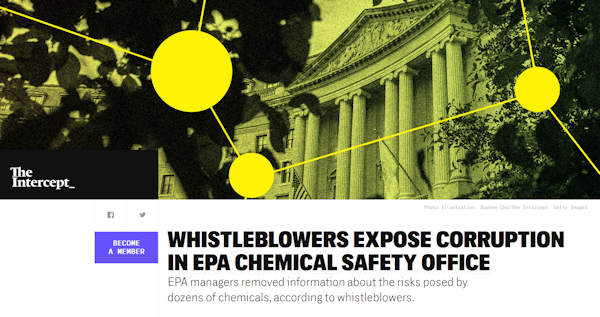 |
| Screenshot of first-place story, Beat Reporting, Small |
Story links:
- "Whistleblowers Expose Corruption in EPA Chemical Safety Office"
- "Leaked Audio Shows Pressure To Overrule Scientists in Hair-on-Fire Cases"
- "New Evidence of Corruption at EPA Chemicals Division"
- "EPA Withheld Reports of Substantial Risk Posed by 1,240 Chemicals"
- "EPA Official Prevented Staff From Warning Public About Widely Used Carcinogen"
Judges' comments: "Intercept reporter Sharon Lerner's series, 'EPA Exposed,' documents coverups by federal environmental officials tasked with oversight of new chemicals. Drawing on leaks from whistleblowers, Lerner detailed the New Chemical Division's pro-industry 'Hair On Fire' diversionary PR strategy, while failing to enforce federal Toxic Substances Control Act mandates. High-caliber reporting by a gifted writer and relentless reporter."
Second Place
"FIRE: A Traditional Beat Becomes Painfully Personal" by Jane Braxton Little for Scientific American, CalMatters, TomDispatch
Story links:
- "To Achieve Forest Health, We Need To Change Our Relationship With Fire" (PDF)
- "AI Could Spot Wildfires Faster Than Humans" (PDF)
- "The Dixie Fire Disaster and Me: Can My Town Rebuild After Losing It All?" (PDF)
- "Firefighting Robots Go Autonomous" (PDF)
- "A Tour Guide to Hell on Earth, Small Town-Style" (PDF)
Judges' comments: "Jane Braxton Little made fire her reporting specialty at a time when it's become a critical part of the climate debate. The range of well-documented articles shared stories which made clear her knowledge and passion for the subject. Then it became personal. Jane's first-person account of the destruction of her hometown of Greenville, California, put her heartbreak in her prose without losing sight of her mission as a journalist. On all levels, it is an outstanding body of work."
Third Place
"Diverting the Mississippi River" by Tristan Baurick, Halle Parker and Mark Schleifstein for The Times-Picayune | New Orleans Advocate
Story links:
- "To Build Wetlands, Louisiana's Largest Sediment Diversion Would Shock Seafood Communities"
- "Louisiana Coastal Restoration Curbed By Too Little Sediment; These States Have Too Much"
- "$2 Billion Project Would Help Save Louisiana Coast — and Stoke Flooding in These Hamlets"
- "Bottlenose Dolphins Might Go 'Functionally Extinct' Here Due to Mid-Barataria Diversion"
- "Here's Why Mississippi River Diversion Was Proposed, How It Might Work"
Judges' comments: "Comprehensive and well-written, this trio's work about the environmental threats to the Mississippi River brought dense but critically important topics to life. They sprinkle their writing with telling anecdotes and reader-friendly metaphors. The range of topics they covered shows the group's ongoing commitment to deeply reported environmental stories."
First Honorable Mention
"Rights of Nature: Beat Reporting" by Katie Surma for Inside Climate News
Story links:
- "Does Nature Have Rights? A Burgeoning Legal Movement Says Rivers, Forests and Wildlife Have Standing, Too"
- "To Stop Line 3 Across Minnesota, an Indigenous Tribe Is Asserting the Legal Rights of Wild Rice"
- "Indigenous Women in Peru Seek To Turn the Tables on Big Oil, Asserting 'Rights of Nature' to Fight Epic Spills"
- "Ecuador's High Court Affirms Constitutional Protections for the Rights of Nature in a Landmark Decision"
- "In the Latest Rights of Nature Case, a Tribe Is Suing Seattle on Behalf of Salmon in the Skagit River"
Judges' comments: "Reporter Katie Surma's globe-spanning coverage of legal claims brought on behalf of endangered animals, forests and other ecosystems may prove to be a call to arms, or a quirky reminder of society's scattershot response to risks posed by rampant development and pollution. A fascinating entry demonstrating Surma's gift for reporting on an emerging environmental battleground."
Second Honorable Mention
"Beat Reporting for The Burning Issue" by Nathanael Johnson for Grist
Story links:
- "Good Wildfire News? Evidence From the Bootleg Fire Supports Thinning Forests."
- "How One Town Put Politics Aside To Save Itself From Fire"
- "Outpaced: Wildfire Control Projects Are Burning Up Before They Can Even Start"
- "Size Isn't Everything"
- "Wildfires Are Erasing Western Forests. Climate Change Is Making It Permanent."
Judges' comments: "Nathanael Johnson of Grist structures his stories with compelling characters, well-placed cliffhangers and rich descriptions that effortlessly move readers through difficult issues. His work about how a rapidly warming planet is killing seedlings was at once horrifying and nuanced. And his tale about how a town in Oregon found ways to reach a consensus on fire prevention was an important antidote to cynics who say nothing will change. His deeply reported stories go beyond the obvious and leave readers with a sense of urgency."
Third Honorable Mention
"Holding a Powerful Multinational Chemical Company to Account" by Phil McKenna and James Bruggers for Inside Climate News
Story links:
- "A Single Chemical Plant in Louisville Emits a Super-Pollutant That Does More Climate Damage Than Every Car in the City"
- "Louisville's Super-Polluting Chemical Plant Emits Not One, But Two Potent Greenhouse Gases"
- "Chemours Says It Will Dramatically Reduce Greenhouse Gas Emissions, Aiming for Net Zero by 2050"
- "The EPA Proposes a Ban on HFC-23, the Most Potent Greenhouse Gas Among Hydrofluorocarbons, by October 2022"
- "Chemours' Process for Curtailing Greenhouse Gas Emissions Could Produce Hazardous Air Pollutants in Louisville"
Judges' comments: "James Bruggers and Phil McKenna of Inside Climate News exposed a huge greenhouse gas polluter, cutting through complex issues and prompting important reforms. The climate — and all of us — are a little bit better because of this aggressive accountability journalism."
Outstanding Explanatory Reporting, Large
First Place
"The Greenland Connection" by Tony Bartelme (senior projects reporter) and Lauren Petracca (photographer and videographer) for The Post and Courier
 |
| Screenshot of first-place story, Explanatory Reporting, Large |
Judges' comments: "This ambitious, imaginative package of stories, photos and videos is an absolute delight to read and view. Beautifully written with stunning images, it helps readers at The Post and Courier understand how climate change in Greenland is affecting people living in the coastal city of Charleston. With compelling stories that include traveling around Greenland with a NASA scientist known as 'Climate Elvis' and interacting with an Inuit shaman, the journalists showed the surprising connections between lands 3,000 miles apart. The stories explain complex scientific ideas in an engaging, understandable way. The project included explainer videos and even a comic book, 'Flood Woman vs. Climate Doom: The Climate Connection.' The overall project, two years in the making, was supported by the Pulitzer Center, Fund for Investigative Journalism and the paper's Investigative Fund."
Second Place
"America's Sanitation Divide" by Catharine Smith, Aliya Uteuova, Nina Lakhani, Maanvi Singh, Rashida Kamal (reporters); Frida Garza (editor); and Alastair Gee (reporter and editor) for The Guardian US
Story links:
- "'If White People Were Still Here, This Wouldn’t Happen': The Majority-Black Town Flooded With Sewage"
- "'We Need Help': Sewage Crisis Hits Majority-Black Town in New York"
- "After Slavery, Oystering Offered a Lifeline. Now Sewage Spills Threaten To End It All"
- "Almost Half a Million US Households Lack Indoor Plumbing: 'The Conditions Are Inhumane'"
- "A Deadly Parasite That Burrows Into the Body Through Bare Feet Could Be Multiplying in This US Community"
Judges' comments: "A team of journalists at the Guardian US wrote compelling and impactful in-depth stories about an issue often overlooked by American news media: how people of color in the United States are disproportionately affected by sewage problems and the inadequacies of indoor plumbing. These sanitation problems occur in the richest nation on Earth. The Guardian's reporters wrote stories showing how Black, Latino and other people of color in New York, Illinois, Texas, Virginia and California are affected. The stories had an impact: the public works commissioner in Mount Vernon, N.Y. said the Guardian's story 'set fire' to the issue and helped unlock a $10 million grant to help the sewage contamination problem."
Third Place
"PBS NewsHour's Coverage of the COP26 Climate Summit" by William Brangham, Ryan Connelly Holmes, Nick Schifrin, Patrick Fok, Sam Lane, Gretchen Frazee and Murrey Jacobson for PBS NewsHour
Team roles:
William Brangham, Correspondent and Producer
Ryan Connelly Holmes, National Affairs Producer
Nick Schifrin, Foreign Affairs Correspondent
Patrick Fok, Producer
Sam Lane, Producer
Gretchen Frazee, Senior Broadcast Producer
Murrey Jacobson, Senior Producer & National Affairs Editor
Story links:
- "What's at Stake?"
- "Will China Abandon Coal in Time?"
- "Developing Nations Pay the Steepest Price"
- "Young People Grapple With Climate Anxiety"
Judges' comments: "The PBS Newshour's comprehensive coverage of the Climate Summit in Glasgow, Scotland includes clear, compelling stories about the urgency of this international climate gathering. The reporting makes viewers care about the climate crisis through personal stories about the victims of flooding in Europe, a climate refugee in Bangladesh, excessive heat in Washington and a devastating wildfire in California. The coverage also examines the double-edged sword of China's continued reliance on burning coal while being a leader in developing clean energy technologies; how developing nations are bearing the burden of wealthy nations' use of fossil fuels; and the climate anxiety felt by younger people. The NewsHour's stories are intelligently written, thoughtful and visually appealing."
First Honorable Mention
"Environmental Justice Stories" by Darryl Fears, Brady Dennis and Juliet Eilperin (reporters); John Muyskens (graphics editor); Salwan Georges (photographer); and Robin Amer (podcast producer) for The Washington Post
Story links:
- "Environmental Justice: The Island Where It Rained Oil"
- "'This Is Environmental Racism'"
- "The Racist Legacy Many Birds Carry"
- "Black People Are About To Be Swept Aside for a South Carolina Freeway — Again"
- "To Stop a Scrapyard, Some Protesters in a Latino Community Risked Everything"
Judges' comments: "This varied collection of stories makes it clear that systemic racism has an environmental component, one that harms the health, quality of life and integrity of Black, Latino and poor communities. Led by reporter Darryl Fears with five other Post journalists, the coverage includes two pieces of historical context — a story about the origin of the term 'environmental racism' and the rise of the environmental justice movement in Warren County, N.C. in the 1980s; and one about how Indigenous names for native birds were replaced by names honoring white supremacists, enslavers and despoilers of Indigenous graves.
"Other stories show how historical patterns of environmental racism persist. In South Carolina, a new highway is slated to slice through a majority Black community, severing neighborhoods in a destructive practice dating back to the 1960s. And on Chicago's South Side and in the U.S. Virgin Islands, Post stories show how influential industries get favorable treatment from politicians and regulators, at the expense of neighborhood residents' health and quality of life."
Second Honorable Mention
"Oceans in Peril" by Susanne Rust, Carolyn Cole, Stuart Leavenworth, Jennifer Lu and Rahul Mukherjee for The Los Angeles Times
Team roles:
- Susanne Rust, Staff Writer
- Carolyn Cole, Staff Photographer
- Stuart Leavenworth, Staff, Project Editor
- Jennifer Lu and Rahul Mukherjee, Graphics and Design
Story links:
- "Something Is Killing Gray Whales. Is It a Sign of Oceans in Peril?"
- "Gray Whales: What To Know About Our West Coast Leviathans and Their Uncertain Future"
- "As Cargo Shipments Boom, Ship Strikes Imperil Whales in California and Worldwide"
- "How We Delved Into the Odyssey of Whale Deaths, Even As a Pandemic Raged"
- "Unprecedented Die-Offs, Melting Ice: Climate Change Is Wreaking Havoc in the Arctic And Beyond"
Judges' comments: "Environmental journalists struggle to report on wildlife die-offs, which take place in remote places over long time spans. Years of research often yield complicated new questions, not clear answers and crisp leads. When a mass die-off of gray whales cascaded up the Pacific Coast from Baja California to the Arctic, reporter Susanne Rust and photojournalist Carolyn Cole faced these difficulties and some unique ones. The COVID-19 pandemic virtually shut down marine research and prevented Rust and Cole from following the wave of whale deaths up the coast. Using social media, they built a network of citizen scientists and others to document the die-off, along with surprising changes in the whales' behavior.
"Gray whales are wide-ranging creatures that have rebounded from the edge of extinction, so the die-off raises worrisome questions about ocean health. Rust weaves together stories of the people who kept the investigation going through the pandemic, context about gray whale ecology and clear explanations of the many factors contributing to the die-off, including changes in marine food webs, linked to climate change, that may be causing some whales to starve. Her stories show how to transform scientific uncertainty from an obstacle into an opportunity for depth and meaning. Cole's photographs and videos, taken underwater, at the sea surface and from drones, include intimate portraits of these engaging animals and scenes that capture the poignancy of their deaths."
Third Honorable Mention
"Black Snow: Big Sugar's Burning Problem" by Lulu Ramadan, Ash Ngu, Maya Miller and Nadia Sussman for The Palm Beach Post and ProPublica
Team roles:
- Lulu Ramadan, Investigative Reporter, The Palm Beach Post
- Ash Ngu, News Application Developer, ProPublica
- Maya Miller, Engagement Reporter, Local Reporting Network, ProPublica
- Nadia Sussman, Video Reporter, ProPublica
Story links:
- "The Smoke Comes Every Year. Sugar Companies Say the Air Is Safe"
- "Sugar Companies Said Our Investigation Is Flawed and Biased. Let's Dive Into Why That's Not the Case."
- "'A Complete Failure of the State': Authorities Didn't Heed Researchers' Calls To Study Health Effects of Burning Sugar Cane"
- "Burning Sugar Cane Pollutes Communities of Color in Florida. Brazil Shows There's Another Way."
- "After Years of Complaints, Florida Improves Pollution Monitoring Near Burning Sugar Cane Fields"
Judges' comments: "It's been an accepted sight in interior South Florida for decades: thick layers of smoke and ash from sugar cane fields that are deliberately set afire to make the cane easier to harvest. Pollution from burning cane fields is a daily fact of life for much of the year in the region's mostly Black and Hispanic farmworker communities — one the state has insisted was safe, and that local media don't routinely cover. After residents sued powerful sugar companies to stop the pollution, The Palm Beach Post and ProPublica series described the practice and its impacts to a readership made up mostly of coastal city dwellers who rarely saw or were affected by the smoke. They told the story of two preschoolers with severe asthma whose grandmother could not comply with a doctor's orders to keep the boys away from second-hand smoke. The reporters exposed a broken government air monitor used to enforce Clean Air Act standards. Working with residents, they set up independent monitors which showed residents were frequently exposed to pollution spikes. The reporters traveled to Brazil, which has banned cane burning, to counter Florida sugar companies' argument that it is essential. The stories got the attention of state lawmakers and Congress and withstood intensive pushback from Big Sugar."
Outstanding Explanatory Reporting, Small
First Place
"Troubled Waters: The Salton Sea Project" by Angela Chen, Tim Kiley, Kent Kay, Sarah-Jayne Arthur, Rebecca Johnson and Justin Tarpening for KESQ
 |
| Screenshot of first-place story, Explanatory Reporting, Small |
Team roles:
- Angela Chen, Reporter
- Tim Kiley, Photographer/Editor
- Kent Kay, Creative Director
- Sarah-Jayne Arthur, Producer
- Rebecca Johnson, News Director
- Justin Tarpening, Editor
Story links:
- "Paradise Lost" (Part 1)
- "Toxic Exposure" (Part 2)
- "A Lake Languished" (Part 3)
- "Salton Sea Plea" (Part 4)
- "The Lithium Lift" (Part 5)
Judges' comments: "In a category replete with excellent explanatory journalism, reporter Angela Chen and Palm Springs' KESQ take the top prize for a broadcast series that produced demonstrable impact. The five-part package, rolled out over more than a month, delved into the science and history of California's perhaps most-troubled water body in a thorough and yet accessible way. Aided by top-notch video and instructive graphics and real-people interviews, the broadcasts sorted out an exceedingly complex ecological problem, focused on the agencies with the most power to remedy it and took questions right to those agencies.
"After poring over many pages of complex government documents and conducting more than four dozen interviews, Chen forcefully held the state accountable for its longstanding failure to honor its commitments. The Legislature later passed a $40 million rescue package. Chen's reporting also prompted local Congress members to demand answers within one month from the U.S. Fish and Wildlife Service and the Imperial Irrigation District. Immediately after the series, the California Natural Resources Agency launched a series of public meetings on the sea. And the Bureau of Reclamation approved $1 million to jumpstart a stalled restoration project.
"The series offered an economic analysis of how the drying up of the lake affects property values, health and loss of ecological habitat. And importantly, it spotlighted proposed solutions."
Second Place
"The Long, Complicated Legacy of a North Carolina Company Town" by Emily Cataneo for Undark Magazine
Judges' comments: "It's common for journalists to reject a subject because it's 'a can of worms.' Reporter Emily Cataneo decided it was time to open the can. For decades, the Aluminum Company of America owned a plant in tiny Badin, North Carolina, a company town with one section for Blacks, who had the most dangerous jobs, and another (nicer) section for whites. The plant closed in 2002, but the area is still suffering the consequences of years of environmental contamination, health hazards and racism. Cataneo had to overcome several challenges, not the least of which was trying to get straight answers from Alcoa. The story lucidly explains arcane scientific matters and tells readers what the company is and isn't doing; why its cleanup efforts are inadequate; and why the company's statements don't wash. She brought the story to life by interviewing those whose health and livelihoods have been most affected by Alcoa's actions. It's a story emblematic of what can happen when unfettered business has sway over individuals."
Third Place
"Living Downstream: The Sea Next Door" by Molly Peterson, Rosa Gonzalez-Andrade, Adriana Torres, Olivia Rodriguez Mendez and Steve Mencher for KRCB-FM, part of Northern California Public Media in Rohnert Park, California
Team roles:
- Molly Peterson, Coordinating Producer
- Rosa Gonzalez-Andrade, Reporter/Host
- Adriana Torres, Reporter/Host
- Olivia Rodriguez Mendez, Producer
- Steve Mencher, Story Editor
Judges' comments: "The Living Downstream podcast took the unique approach of telling the story of California's largest lake from the perspective of a Spanish-speaking community that often feels it is being erased in the telling of the complex narratives that shape the reality of the Salton Sea.
"Student and field reporters Adriana Torres and Rosa Gonzalez worked closely with experienced storytellers Olivia Rodriguez Mendez, Molly Peterson and Steve Mencher to give life to a story that is human and compelling.
"The team used the power of first-person storytelling and all the tools of the podcast medium to unravel the complex elements that in turn weave together the troubled ecology of a desert lake in a near constant state of flux.
"The public health impacts are potentially devastating, the state inaction perhaps too late and the podcast offers a perspective rarely drawn, one where the lake is a neighbor in need of care.
"It is a Herculean effort that wrestles with a subject as large as the lake itself. Bravo."
First Honorable Mention
"Ghost Forests" by Breanna McCabe for Montana PBS
Judges' comments: "In a contest filled with worthy entrants, 'Ghost Forests' from Montana Public Broadcasting Service stood out above most.
"Stunning landscapes helped tell the story of the whitebark pine, a tree species struggling to survive in a changing climate. Allowing people to share their relationship with the tree and the mountains where it survives made the storytelling accessible. Companion materials that made their way to the classroom only added to the program's value.
"Well shot, well edited and well told."
Second Honorable Mention
"CREEP: Hogs Gone Wild and Rat Race" by Elizabeth Friend, Laura Pellicer, Amanda Magnus, Charlie Shelton-Ormond, Adithi Ramakrishnan, Jenni Lawson and Lindsay Foster Thomas for www.wunc.org (WUNC North Carolina Public Radio)
Team roles:
Elizabeth Friend, Co-Creator, Co-Host, Reporter
Laura Pellicer, Co-Creator, Co-Host, Reporter
Amanda Magnus, Editor
Charlie Shelton-Ormond, Producer
Adithi Ramakrishnan, Researcher
Jenni Lawson, Sound Engineer
Lindsay Foster Thomas, Executive Director
Judges' comments: "In these compelling, nearly half-hour-long podcasts, a team of reporters at WUNC profiles two invasive species — feral hogs and rats — clearly revealing to listeners the unintended consequences of human behavior, an increasingly timely topic as the impacts of climate change become more apparent. Although the focus is on the American South, the team traveled as far as the Falkland Islands for a visit with a woman assigned to make sure the islands remain rat-free.
"The podcasts are enlivened by interviews with experts whose research reveals what's behind the animals' remarkable adaptations. The team also asked people whose lives and work are changing because of these creatures to record interviews from their farms, kitchens, driveways and backyards, providing a real-world context to problems that can feel academic."
Third Honorable Mention
"The Internet Has a Rat Poison Problem" by Chris Sweeney for Audubon Magazine
Judges' comments: "An enterprising and eye-opening look at how government regulation of second-generation anticoagulant rodenticides is falling short. While the U.S. Environmental Protection Agency's rules forbid selling these super-toxic pesticides 'in channels of trade likely to result in retail sale' such as hardware stores and 'other general retailers,' the author was able to order massive quantities over the internet. 'A loophole big enough to drive an Amazon delivery truck through,' as the story put it. The first-person approach made what could be a dry story reader-friendly. It also does a nice job of exposing the dangers of rat poisons.
"After inquiries from the reporter, the products were removed from the Sears and Kmart websites, and eBay appears to have cracked down, too. Readers contacted the EPA as a result of the story, as well."
Outstanding Feature Story, Large
First Place
"Climate Change Is Exposing the Racism Behind an Oregon Water War" by Jeremy Raff, Josh Rushing, Adrienne Haspel, Erik Ljung, Laila Al-Arian and Darya Marchenkova for Al Jazeera English
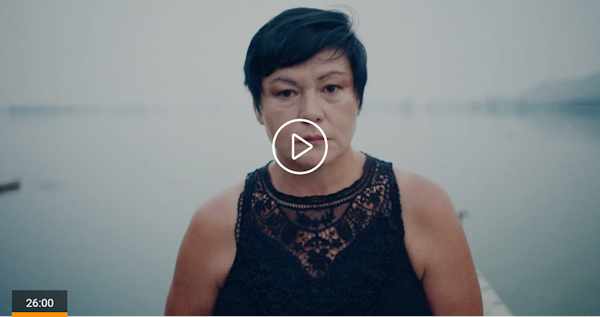 |
| Screenshot of first-place Feature Story, Large |
Team roles:
- Josh Rushing, Correspondent
- Jeremy Raff, Producer
- Adrienne Haspel, Editor
- Erik Ljung, Director of Photography
- Laila Al-Arian, Executive Producer
- Darya Marchenkova, Associate Producer
Judges' comments: "Jeremy Raff, Josh Rushing, Adrienne Haspel and Erik Ljung skillfully capture the fears of farmers and Native Americans who stand on two sides of the fight for water in the Klamath Basin. The Western drought has again left only enough water for one side — if more water is released for farming, the fish Native Americans rely on will die. If it isn’t released, crops in the basin could die. In allowing people to tell their stories, the team highlights commonalities, particularly the powerful roles history and religion play in each set of beliefs about the water, and it shows the stark differences between those beliefs, while carefully teasing apart the conflicts that have led to hostility, open racism and feelings of oppression in the community. The personal stories are gripping. The video also stands out for how effectively it weaves lessons in ecology and climate science throughout the narrative. We wanted to keep following these stories and learning more."
Second Place
"The Amazon Is Fast Approaching a Point of No Return" by Jessica Brice and Michael Smith for Bloomberg Businessweek and Bloomberg Green
Judges' comments: "Jessica Brice and Michael Smith take readers to the frontlines of one of the most prominent environmental stories of our lifetimes — the destruction of the Amazon rainforest. Their deeply reported account explains history and present day politics through the lens of people whose voices are rarely heard in U.S. media. The result is a new understanding of the complexity, humanity and scope of the problem."
Third Place
"To Be a Field of Poppies" by Lisa Wells for Harper's Magazine
Judges' comments: "Lisa Wells introduces us to the new field of composting human remains with a blend of engaging narrative, level-headed reporting and flashes of poetic essay writing. It's a squeamish topic for many people, including the author. Nevertheless, Wells guides us through the practical, cultural, legal and environmental considerations of turning cadavers into compost. The account of Amigo Bob, one of the first nine humans to be legally composted, was touching and informative. The author shares her personal feelings about human composting in a straightforward way that makes it easier for readers to connect with the touchy subject."
First Honorable Mention
"Who Will Pay To Protect Tech Giants From Rising Seas?" by Lauren Sommer, Neela Banerjee, Ryan Kellman, Daniel Wood, Alyson Hurt, Ruth Talbot and Duy Nguyen for NPR
Team roles:
- Lauren Sommer, Climate Correspondent
- Neela Banerjee, Supervising Climate Editor
- Ryan Kellman, Visual Producer
- Daniel Wood, Data Reporter, Visuals Team,
- Alyson Hurt, Acting supervising editor, News Apps/graphics
- Ruth Talbot, News App Developer
- Duy Nguyen, News Apps/Graphics Intern
Judges' comments: "NPR refined an innovative form of storytelling with this project by using interactive maps paired with photos to explore who pays for coastal protection when the water rises. Lauren Sommer, Neela Banerjee, Ryan Kellman, Daniel Wood, Alyson Hurt, Ruth Talbot and Duy Nguyen laid out how new technology company campuses on San Francisco Bay have affected nearby low-income communities, and the high costs those residents face for flood protection."
Second Honorable Mention
"Postcard From Thermal: Surviving the Climate Gap in Eastern Coachella Valley" by Elizabeth Weil, Mauricio Rodríguez Pons, Nadia Sussman, Almudena Toral, Mollie Simon and Justine Simons for ProPublica
Team roles:
- Elizabeth Weil, Reporter, ProPublica
- Mauricio Rodríguez Pons, Visual Reporter, ProPublica
- Nadia Sussman, Video Journalist, ProPublica
- Almudena Toral, Executive Producer, Video, ProPublica
- Justine Simons, Executive Producer, TIME
- Mollie Simon, Research Reporter, ProPublica
Judges' comments: "ProPublica's team found a perfect setting to illustrate the type of inequities likely to be magnified as the planet warms. Creative multimedia and descriptive writing help readers understand how privilege helps those most responsible for climate change keep on living the dream while low-income residents struggle with the consequences of a warming world."
Third Honorable Mention
"Cheetahs for Sale" by Rachael Bale for National Geographic Magazine (with photographs by Nichole Sobecki)
Judges' comments: "Excellent photographs and good reporting and writing made this a compelling story about the struggle to stop smuggling of cheetahs from Somaliland to wealthy buyers."
Outstanding Feature Story, Small
First Place
"The Collapse of Wild Red Wolves Is a Warning That Should Worry Us All" by Jimmy Tobias for The Nation
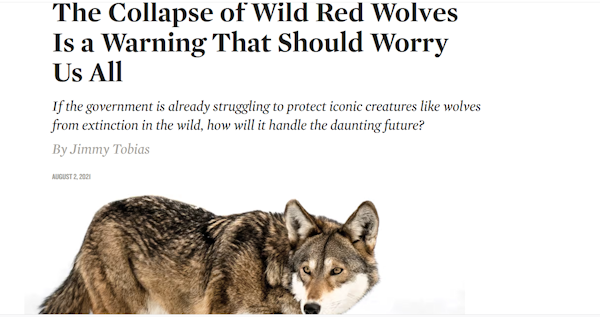 |
| Screenshot of first-place Feature Story, Small |
Judges' comments: "This mesmerizing use of public records details the quiet collapse of an iconic and successful program to save the world's last wild red wolf population. The story centers on one wolf, a mother, who was shot and killed with the permission of the federal government. Her death demands that readers come to care about these creatures. It is a story exhaustively researched and beautifully told, and serves as a testament to the incredible good journalism can do: after the story was published, the federal government changed its mind about abandoning the red wolf reintroduction program in North Carolina and recommitted to saving these wolves on the brink of extinction."
Second Place
"Three Days in the Theater of Old-Growth Logging and Protest" by Arno Kopecky for Hakai Magazine and The Tyee
Judges' comments: "A moving, first-person account of a tense and complicated clash between police, protesters and First Nations on Vancouver Island, home to some of the oldest and biggest trees in the world. Kopecky does a masterful job describing this magnificent old growth forest in First Nations' territory, but he also takes time to contextualize the role of colonialism in its destruction."
Third Place
"You Strike a Match" by Julia Shipley for Grist and Rolling Stone
Judges' comments: "This meticulous profile of anti-oil pipeline activists examines the motivations and friendship of two young women who were willing to risk their freedom for their beliefs. Julia Shipley layers her coming-of-age narrative with a history of environmental protest movements. Excellent, thought-provoking work."
First Honorable Mention
"The Violent Cost of Conservation" by Tom Clynes for Audubon Magazine
Judges' comments: "This harrowing story describes the increasing violence endured by those committed to protecting the planet. It is told through the lens of a conservationist who had to flee his home in Colombia for Canada to avoid an assassination plot against him, humanizing the extraordinary sacrifices many must make to try to save the Earth's most fragile places."
Second Honorable Mention
"Can 'The People' Solve Climate Change? France Decided To Find Out." by Shannon Osaka for Grist
Judges' comments: "An unusual case study of the effort in France to recruit a random group of 150 citizens to break through political gridlock and take on the most challenging issue of the day. With compelling narrative and analysis, the story offers both frustrating and hopeful lessons for democracies around the world and for addressing the climate future."
Third Honorable Mention
"Tide and Time: Sea Level Rise and Solastalgia on North Carolina's Outer Banks" by Justin Cook for The Coastal Review Online, with support from the Pulitzer Center Connected Coastlines Initiative
Sidebar: "Outer Banks Ties Inform Photojournalist's Climate Reporting"
Judges' comments: "What can we not bear to lose? In an expansive multimedia production, Justin Cook illustrates the consequences of the hungry tides advancing across the Outer Banks, eroding history and community."
Outstanding Student Reporting
First Place
"Hogwash" by Cameron Oglesby, Duke University, published by Grist
 |
| Screenshot of first-place Student Reporting story |
Judges' comments: "'Hogwash' by Cameron Oglesby stood out for its depth of research. Oglesby took a complicated, often overlooked and underreported topic, and made it understandable and engaging."
Second Place
"Our Poisoned Kids" by Sydney Gold and Jessica Ruiz, Newhouse School at Syracuse University, published by The NewsHouse
Judges' comments: "The story had solid information explaining that a national public health issue is harming people in their community. And the reporters built relationships with their subjects that allowed them to show how the problem played out in the lives of two children."
Third Place
"Ominous and Overlooked: Low-Attention Climate Disasters in Missouri" by Katelynn McIlwain, Anneleen Ophoff, Rashi Shrivastava, Julian Nazar, Fairriona Magee, Courtney Perrett, Hannah Gallant, Alex Fulton and Moy Zhong, University of Missouri, published by Vox Magazine
Story links: "Weathering the Storm: Missouri Copes With Low-Attention Disasters" (package landing page with interactive map linking to individual stories)
Sidebar: "Behind the Scenes: 'Weathering the Storm'" (video interviewing students who worked on the package and faculty member Ron Stodghill)
Judges' comments: "The authors came up with an original idea to show the impact of climate change on their community — rather than a large-scale disaster, Missouri is being pummeled by a series of small-scale disasters. The stories show how the cumulative impact of storms and floods — many of them too small to qualify for federal disaster aid — is hurting the state's most vulnerable people and straining its small towns."
First Honorable Mention
"Digital Debris" by Emma Krab, Iman Farid, Shreyoshi Ghosh and Olivia Taylor, University of Nebraska-Lincoln, published by Nebraska News Service
Story links:
- "Digital Debris" (podcast transcript)
- "Lithium Batteries and Other Electronic Waste Create Challenges for Nebraska Recyclers and Regulators" (accompanying story)
Judges' comments: "The authors looked at electronics recycling, why it does and doesn't happen in Nebraska, and why lithium batteries and landfills don't mix."
Second Honorable Mention
"As the Gulf of Mexico Heals From the Deepwater Horizon Oil Spill, Stringent Safety Proposals Remain Elusive" by Nicholas Portuondo, Northwestern University, published by Inside Climate News
Video Accompaniment: "What Went Wrong With Deepwater Horizon"
Judges' comments: "More than a decade on from the Deepwater Horizon oil spill in the Gulf of Mexico, Nicholas Portuondo wrote an update for Inside Climate News. In a nicely paced story, he explores the continuing struggle over safety regulations for underwater oil wells."
Rachel Carson Environment Book Award
First Place
"Wild Souls: Freedom and Flourishing in the Non-Human World" by Emma Marris
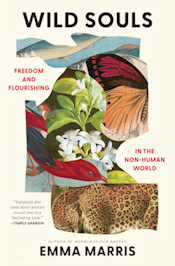 |
Published by Bloomsbury Publishing
Judges' comments: "What is the meaning of 'wild' in a world with humanity's fingerprints nearly everywhere? What do we owe our non-human fellow inhabitants of the planet we have transformed? Emma Marris leads us on a provocative philosophical journey that forces us to confront not just humans' responsibility for protecting the myriad animal species whose welfare our activities threaten, but also the morality of our conservation approaches, their impacts on individual animals and the fundamental contradiction between human efforts to save wildness, and wildness itself. Meticulously researched and cogent — painfully so, at times — 'Wild Souls' is also a lively and adventurous read. We track the nearly-extinct 'akikiki bird in the misty mountains of Kauai, sail to the remote New Zealand island of Mauitaha with Maori guardians of the cherished rodent kiore and more.
"In the end, Marris leaves us with two lists: things that are valuable to the environment, such as the diversity of life, and things that are not, such as the concept of naturalness. 'We need to do a better job sharing with non-human animals,' Marris concludes. This thought-provoking book is an invaluable guide."
- "'Wild Souls' Explores Paradox of Managing Species To Save Them," SEJournal's BookShelf review, December 15, 2021, by Jennifer Weeks.
Second Place
"Planet Palm: How Palm Oil Ended Up in Everything — and Endangered the World" by Jocelyn C. Zuckerman
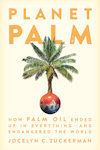 |
Published by The New Press
Judges' comments: "Jocelyn Zuckerman documents the relentless seepage of palm oil into the every-day consumer's life. And she does so by starting in 19th century Germany and moving through successive colonizations of the Earth to show how profit and greed ousted land-based people and supplanted their small holdings with palm plantations. Soap, lipstick, Nutella — the list of palm-oil seepage is staggering.
"Zuckerman's research is formidable and her narrative makes for compelling reading."
Third Place
"West Side Rising: How San Antonio's 1921 Flood Devastated a City and Sparked a Latino Environmental Justice Movement" by Char Miller
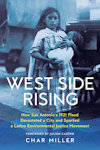 |
Published by Maverick Books/Trinity University Press
Judges' comments: "'West Side Rising' is about a flood that happened more than 100 years ago, but the story could not be more relevant to the current moment of rampant climate change and deepening inequality. The author deftly shows how a flood that hit San Antonio in 1921 unleashed a cascade of racist political decisions, and created an environmental justice movement led by the city's Latino residents and which still exists today.
"Readers of this important book will find disturbing and surprising parallels between what happened in San Antonio and the disasters plaguing the U.S. today."
First Honorable Mention
"Environmentalist's Dilemma: Promise and Peril in an Age of Climate Crisis" by Arno Kopecky
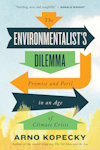 |
Published by ECW Press
Judges' comments: "Arno Kopecky goes where many environmentalists fear to tread: right into the heart of personal life, asking a tough question: how can one live an environmentally conscious life while embedded, as most of us are, in a 21st-century capitalist consumer culture?
"Kopecky’s exploration of this dilemma is wry, self-aware and honest."
Second Honorable Mention
"Beloved Beasts: Fighting for Life in an Age of Extinction" by Michelle Nijhuis
 |
Published by W. W. Norton and Company
Judges' comments: "'Beloved Beasts' tells the story of the conservation movement, including some overlooked activists and lesser-known animals. The book digs into the disagreements, frustrations and blind spots of those who seek to protect wildlife and nature, and goes beyond charismatic megafauna to tell the stories of more diverse animals and ecosystems. Nijhuis doesn't shy away from the racism and colonialism baked into the history of conservation.
"This important book will help us understand how to avoid the mistakes of the past as we confront the current biodiversity crisis."
Third Honorable Mention
"The Sound of the Sea: Seashells and the Fate of the Oceans" by Cynthia Barnett
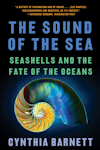 |
Published by W. W. Norton and Company
Judges' comments: "Original, lyrical and pulsing with the rhythm of the ocean, 'The Sound of the Sea' is a deep dive into the fascinating and beautiful world of mollusks. In a winding narrative, coiled like a spiral shell, Barnett unspools a series of stories about seashells and their animal architects. In the process, she shows their long-standing connections with humans, such as the Dutch seashell-collecting frenzy of the late 1500s-early 1600s, which, as Barnett puts it, 'lit the flame of global consumerism that has become an inferno.' That flame now manifests as warming, acidifying oceans that impinge on mollusks' ability to build their calcium carbonate homes.
"Seashell trumpets have long been used to call people to action, the book notes. It's time we listen."
- "The Call of the Conch — How Seashells Tell Nature's Story," SEJournal's BookShelf review, February 2, 2022, by Tom Henry.
Esteemed Judges and Screeners, 2022 SEJ Awards for Reporting on the Environment
Erik Anderson, Environment Reporter, KPBS Public Media
Tony Bartelme, Senior Projects Reporter, The Post and Courier
David Biello, Science Curator, TED Conferences
David Boraks, Freelance Journalist
Sarah Bowman, Environment Watchdog Reporter, The Indianapolis Star
Merrill Brown, Chief Executive Officer, The News Project Inc.
Denis Cuff, Bay Area News Group (retired)
Jim Detjen, Emeritus Professor, Michigan State University (retired)
Heather Dewar, Environment and Science Writer
Dan Fagin, Professor of Journalism and Director of the Science, Health and Environmental Reporting Program, New York University
Claire Galofaro, National Writer, The Associated Press
Beth Gardiner, Freelance Journalist
Jordan Gass-Pooré, Investigative Journalist and Founder/Host/Producer, Hazard NJ Climate Podcast
Erica Goode, Editor of Special Projects, Inside Climate News
Dan Haugen, Managing Editor, Energy News Network
Rebecca Hersher, Reporter, National Public Radio's Science Desk
Derrick Jackson, Independent Writer and Fellow, Union of Concerned Scientists
Cheryl Katz, Freelance Science/Environment Journalist
Bill Kelly, Senior Producer, Nebraska Public Media
Elaine Kurtenbach, Asia Business Editor, The Associated Press
Nicholas Kusnetz, Reporter, Inside Climate News
Mike Lee, Reporter, E&E News
Mary Mazzacco, Journalist
Robert McClure, Independent Journalist
Stacy Morford, Environment and Climate Editor, The Conversation US
Brian O’Donoghue, University of Alaska Fairbanks (retired)
Beth Parke, Founding Executive Director, Society of Environmental Journalists (retired)
Francis Plourde, Producer, CBC/Radio-Canada
Sinduja Rangarajan, Senior Investigative Data Reporter, Bloomberg News
Vijay Shankar, Freelance Journalist
Susan Sharon, Deputy News Director, Maine Public Radio
David Steinkraus, Freelance Writer (specializing in water); former Wisconsin Newspaper Journalist
Doug Struck, Senior Journalist-in-Residence, Emerson College; and Freelance
Laura Ungar, Medical and Science Writer, The Associated Press
Lynne Van Luven, Professor Emerita, University of Victoria Department of Writing (British Columbia)
Brett Walton, Reporter, Circle of Blue
Leslie Ware, Freelance Editor; Editor at Large, Consumer Reports (retired)
Tegan Wendland, Editorial Director, Mississippi River Basin Ag & Water Desk
Tim Wheeler, Associate Editor/Senior Writer, Bay Journal
Carolyn Whetzel, Independent Journalist
Trish Wilson, National Editor, Climate and Environment Team, The Washington Post
SEJ 2022 Awards Committee
Emilia Askari, Independent Journalist
Rocky Kistner, Independent Journalist
Parimal Rohit, Austin Business Journal
Sara Schonhardt, International Climate Reporter, E&E News and SEJ Board Liaison to the Awards Committee
Chris Bruggers, Senior Advisor, Awards and Elections
Thank you to our Awards judges and screeners over the years!













 Advertisement
Advertisement 



